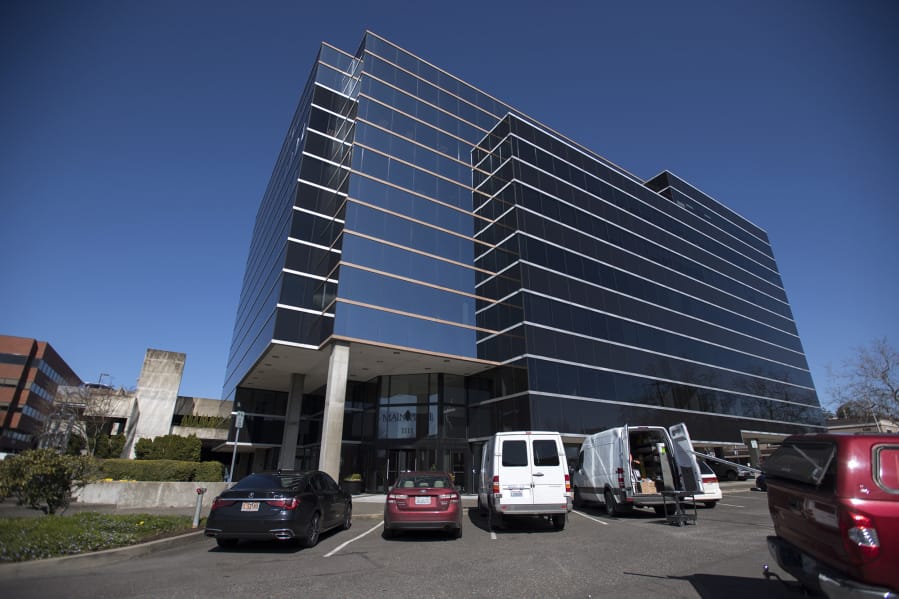(Total Views: 637)
Posted On: 03/17/2020 2:05:18 PM
Post# of 157296

https://www.columbian.com/news/2020/mar/17/va...ronavirus/
Vancouver’s CytoDyn says HIV treatment could be adapted to fight coronavirus

Biotech company, CytoDyn, which is headquartered at 1111 Main Street, pictured, say they're about to start testing a coronavirus treatment drug, as seen Monday afternoon, March 16, 2020. (Amanda Cowan/The Columbian)
Vancouver biotechnology company CytoDyn hopes to join the fight against COVID-19 by adapting one of its existing HIV treatments for treating a lethal complication of the disease.
The company is seeking approval from the U.S. Food and Drug Administration to fast-track a test run on COVID-19 patients of its signature product, leronlimab, an antibody that binds to a receptor called CCR5 on certain immune system cells.
The company developed the treatment to combat HIV infection, but there’s a secondary effect, according to CEO Nader Pourhassan: When the antibodies bind to CCR5 receptors on certain T-cells, they slow the rate at which those cells produce inflammatory cytokines — the signaling molecules that promote inflammation in the body.
That’s where the coronavirus comes into play, Pourhassan said. COVID-19 typically results in flu-like symptoms, but it poses a greater risk to the elderly and patients with underlying health issues. One of the biggest risks is that the virus can cause a major inflammatory response in the lungs, leading to a condition called Acute Respiratory Distress Syndrome, which can be fatal.
CytoDyn theorizes that leronlimab’s anti-inflammatory properties could prevent coronavirus patients from developing Acute Respiratory Distress Syndrome. It wouldn’t cure the virus, Pourhassan said, but it would prevent one of its most lethal complications.
The company announced March 9 that it was exploring treatment options for coronavirus and intended to file an Investigational New Drug application and a Phase 2 clinical trial protocol with the FDA, asking for permission to fast-track testing of leronlimab as a coronavirus treatment.
The company announced Monday that it had submitted a modified trial protocol in response to a request from the FDA. The modified protocol calls for a randomized, double-blind, placebo-controlled study that would involve 75 patients in up to 10 locations in the United States, for a treatment window of approximately six weeks.
“We appreciate the FDA’s timely input on protocol design and hope to start the treatment study in the very near future,” CytoDyn interim Chief Medical Officer Jacob Lalezari said in a statement.
CytoDyn has pursued new potential uses for leronlimab before. The treatment was initially envisioned solely as an HIV suppressant, Pourhassan said, but about four years ago, the company’s researchers began to investigate its potential to treat a type of breast cancer, because the CCR5 receptor plays a role in tumor metastases.
Leronlimab already has FDA fast-track status to test its effectiveness as an HIV and cancer treatment.
Data from clinical trials of the drug in cancer patients highlighted its potential anti-inflammatory properties, Pourhassan said, prompting CytoDyn to begin investigating its ability to prevent Acute Respiratory Distress Syndrome when the coronavirus emerged.
Vancouver’s CytoDyn says HIV treatment could be adapted to fight coronavirus

Biotech company, CytoDyn, which is headquartered at 1111 Main Street, pictured, say they're about to start testing a coronavirus treatment drug, as seen Monday afternoon, March 16, 2020. (Amanda Cowan/The Columbian)
Vancouver biotechnology company CytoDyn hopes to join the fight against COVID-19 by adapting one of its existing HIV treatments for treating a lethal complication of the disease.
The company is seeking approval from the U.S. Food and Drug Administration to fast-track a test run on COVID-19 patients of its signature product, leronlimab, an antibody that binds to a receptor called CCR5 on certain immune system cells.
The company developed the treatment to combat HIV infection, but there’s a secondary effect, according to CEO Nader Pourhassan: When the antibodies bind to CCR5 receptors on certain T-cells, they slow the rate at which those cells produce inflammatory cytokines — the signaling molecules that promote inflammation in the body.
That’s where the coronavirus comes into play, Pourhassan said. COVID-19 typically results in flu-like symptoms, but it poses a greater risk to the elderly and patients with underlying health issues. One of the biggest risks is that the virus can cause a major inflammatory response in the lungs, leading to a condition called Acute Respiratory Distress Syndrome, which can be fatal.
CytoDyn theorizes that leronlimab’s anti-inflammatory properties could prevent coronavirus patients from developing Acute Respiratory Distress Syndrome. It wouldn’t cure the virus, Pourhassan said, but it would prevent one of its most lethal complications.
The company announced March 9 that it was exploring treatment options for coronavirus and intended to file an Investigational New Drug application and a Phase 2 clinical trial protocol with the FDA, asking for permission to fast-track testing of leronlimab as a coronavirus treatment.
The company announced Monday that it had submitted a modified trial protocol in response to a request from the FDA. The modified protocol calls for a randomized, double-blind, placebo-controlled study that would involve 75 patients in up to 10 locations in the United States, for a treatment window of approximately six weeks.
“We appreciate the FDA’s timely input on protocol design and hope to start the treatment study in the very near future,” CytoDyn interim Chief Medical Officer Jacob Lalezari said in a statement.
CytoDyn has pursued new potential uses for leronlimab before. The treatment was initially envisioned solely as an HIV suppressant, Pourhassan said, but about four years ago, the company’s researchers began to investigate its potential to treat a type of breast cancer, because the CCR5 receptor plays a role in tumor metastases.
Leronlimab already has FDA fast-track status to test its effectiveness as an HIV and cancer treatment.
Data from clinical trials of the drug in cancer patients highlighted its potential anti-inflammatory properties, Pourhassan said, prompting CytoDyn to begin investigating its ability to prevent Acute Respiratory Distress Syndrome when the coronavirus emerged.
